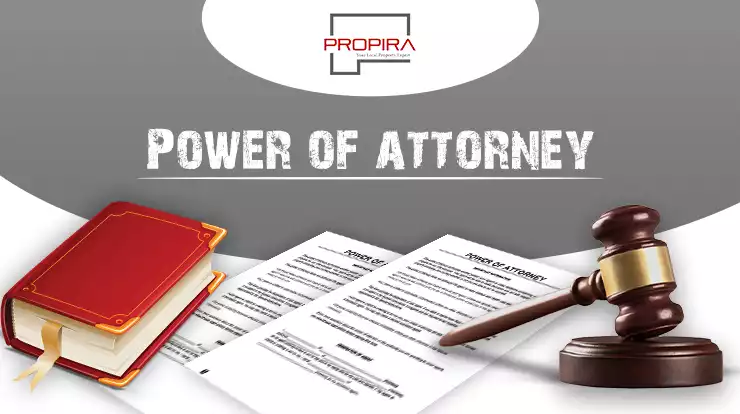
Complete Guide of Power of Attorney (POA) For Property in India
Complete Guide of Power of Attorney (POA) For Property in India

The concept of Power of Attorney with regard to properties and real estate matters, in general, is confusing to a lot of people. In this blog, we are Attempting to explain this concept in detail. We hope you will learn and enjoy reading our article.
A general power of attorney for property can be legally approved if the insane person is not legally authorized to act as an attorney.
A person can only buy a property in your name if you have mentioned in your general power of attorney that he can buy a property on your behalf. You can do this if you want, but the purchase on your behalf means that you have to do it in your name.
What is a Power of Attorney (POA)?
A Power of Attorney (POA) is an important legal document that allows you to appoint another person or organization to manage your property (power of attorney), medical affairs, and financial affairs in your absence. According to this arrangement, the person who authorizes others to act on his behalf is called the principal, donor, or donee. A qualified person is called a representative or power of attorney.
Depending on the terms of the contract, an authorized representative can have broad or limited powers to make legal decisions related to the property (power of attorney) and medical and financial matters.
Types Of Power Of Attorney
There Are 4 Types Of Attorney:
● General Power of Attorney.
A general power of attorney (GPOA) is a legal document that authorizes one person (called the agent) to act on behalf of another person (the principal). “जनरल पावर ऑफ अटॉर्नी (GPOA) एक कानूनी दस्तावेज है जो एक व्यक्ति (एजेंट कहा जाता है) को दूसरे व्यक्ति (प्रिंसिपल) की ओर से कार्य करने के लिए अधिकृत करता है।” Managers give this permission to agents because they cannot make decisions for themselves. This GPOA is of a non-specific nature, and the representatives have the power to make legal, medical, financial, and business (except real estate) decisions. It is irrevocable and the principal must agree to approve what is done by the GPOA.
● Limited or Special Power of Attorney
A special power of attorney (SPOA) is a legal document that allows one person (called the agent) to act on behalf of another person (the principal). Managers give this permission to agents because they cannot make decisions for themselves. This SPOA has a special feature. This is irrevocable and the principal must agree to approve what is being done by the SPOA.
If you can't decide for yourself, use Power of Attorney for Property. This may be for health reasons, or you may not be able to be there to make it happen physically, but it is necessary.
● Medical or health care power of attorney
A medical power of attorney is a legal document that designates one person as the medical representative of another person. Responsible agents are responsible for making healthcare decisions and enabling physicians and other
healthcare professionals to provide the necessary and appropriate care per the patient's wishes. This includes end-of-life care.
● Durable Power Of Attorney
A general durable power of attorney allows someone to act on a wide range of legal and business matters and remains in effect even if you become incapacitated. Also known as power of attorney. The power of attorney for property is effective immediately or only in the event of incapacity.
The person you appoint is known as your agent or attorney, but the person or company does not have to be an attorney. A real estate attorney can handle many types of transactions, including
1. Buying and selling property
2. Manage bank accounts, statements, and investments.
3. Submitting a tax return.
4. Apply for government benefits.
Who is involved in a Power of Attorney?
Principal-
The principal is the owner of the power of attorney. He delegates authority to another person who acts on his behalf.
Agent or Attorney An agent-
Also called an attorney-in-fact-is an entity authorized to act on behalf of a principal. Any person over 18 years of age and with legal rights can act as a representative. Certain trusted financial institutions can also be agents.
Notary public and witnesses-
For correct implementation, the power of attorney must be signed by the original, and two witnesses must be signed by the manager.
Third Party-
A third party is often referred to as an individual or entity acting as an agent on behalf of the principal.
Lawyer-
A power of attorney gives another person many powers that should be drafted by an experienced attorney.
Yes, you can nominate more than one person in a durable power of attorney, but most people usually avoid this.
Also Read - CICDO Lottery 2022 - 2023
Can you have more than one power of attorney?
First, there is no legal reason why you cannot name more than one person as your power of attorney. If you want, you can nominate up to 10 people. The real question is, how many people do you really need to name? The answer is usually no unless you have a specific reason and consider possible problems.
The reason for the lack of multiple recommendations is that when conflicts arise, there is always the possibility that people will disagree with the decisions because there are actually several attorneys nominated. Disputes can mean paralysis, as each decision-maker can overrule the other, and guardianship proceedings are usually the only way out.
What does a POA allow an attorney to do?
A Power of Attorney (POA) is when you give a trusted friend or family member the right to act on your behalf. In this case, the power of attorney holder is authorized to take very specific actions and decisions on behalf of the grantor.
When signing a POA, you should take precautions to ensure that your interests are fully protected.
Who signs a power of attorney document?
A power of attorney is a legal document that must comply with certain laws that apply in all states. Who should sign the power of attorney depends on several factors. Because the laws regarding power of attorney vary from state to state, and different states have different laws that apply to different types of power of attorney. If you need legal advice about signing a power of attorney, always consult an attorney.
Principal
A power of attorney can only be communicated in writing. In all states, the power of attorney must be signed by the principal, who is the person granting the decision-making power. If the manager is physically unable to sign, you can ask someone else to sign the document for you.
Agents
The representative or representative of the organization to whom power of attorney has been given can sign the documents in any way at the request of the director. The temporary representative may also be required to sign a power of attorney according to the terms of the document.
Witness
Some states require a special power of attorney to be signed by a witness. For example, some states require at least one witness to sign the document before medical powers of attorney and other advanced directives become effective.
Notary public
Some states also require a notarized power of attorney. A power of attorney can be notarized without voiding the document, even if not required by state law.
Documents required for POA registration:
- Passport-size party photos
- proof of address of the parties;
- Identification documents like driving licenses, voter ID cards, and Aadhaar cards.
- Property Tax Receipt or Index II or Electricity Bill (if POA is related to property).
In our continued effort to provide valuable information regarding the real estate sector. Stay tuned for more awesome blogs.
Propira is a top real estate portal that aims to provide seamless intermigration for buyers, and sellers of properties in Alwar. We facilitate the buying and selling of residential, commercial, and agricultural properties.
Love What You Read? Share your thoughts with us
Thank you










Write Comment